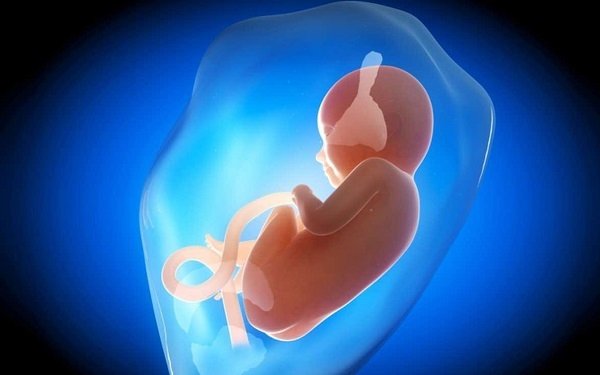Signs of infant inhalation of meconium
Meconium is dark green, produced in the intestines of the fetus. After birth, a newborn will pass meconium for the first few days. However, due to the pressure the baby goes through before or during birth, it can cause the baby to pass meconium right in the uterus, which mixes with the amniotic fluid and causes the baby to inhale meconium. This condition is known as meconium aspiration syndrome (MAS).
1. Recognizing signs of children inhaling meconium
Babies are often born with large stature, the whole body is covered with meconium, the oropharynx is filled with amniotic fluid with meconium, peeling skin. Withered umbilical cord Newborn with respiratory distress: rapid breathing, dyspnea, whining, cyanosis, apnea, nasal flaps, thoracic indrawing, rib cage bradycardia Slow heart rate, possibly small more than 100 times/minute. Decreased muscle tone, weak movement Possible fetal malnutrition Child aspiration of meconium can be severe asphyxia, clinical death Auscultation of the lungs: may have moist rales or bronchial rales X-ray of the lungs shows: dark nodules Unknown border is more concentrated around the hilum, air retention in the lung, atelectasis and scattered emphysema. In some cases there is pneumothorax, there may be pneumothorax or pneumomediastinum. Biochemistry: hypoxemia, hypercoaemia, acidosis. Severe cases may show signs of pulmonary hypertension in the following hours. Children who breathe in meconium and have to breathe oxygen for a long time have an increased risk of chronic lung disease, increased airway sensitivity (prone to developing asthma, pneumonia), mental retardation, and deafness.
2. Diagnostic test for meconium aspiration syndrome
Blood count Blood gas Electrolyte, calcium, sugar, CRP X-ray of the heart and lungs. Echocardiography when pulmonary hypertension is suspected.
3. Distinguish from other signs
Transient tachypnea in neonates: common in children 34 - 37 weeks of gestation, the disease improves rapidly. Meconium aspiration syndrome is common in children with a gestational age of more than 41 weeks or with fetal malnutrition.

Dấu hiệu trẻ hít phải phân su
Acute respiratory distress syndrome: often occurs in premature babies Pneumonia: some cases of pneumonia are difficult to distinguish from Meconium aspiration syndrome. However, in the case of children with pneumonia caused by aspiration of meconium, the amniotic fluid often contains meconium. Early cyanotic congenital heart disease: to distinguish from meconium aspiration syndrome by clinical examination, chest X-ray and echocardiography. Primary pneumothorax: characterized by amniotic fluid without meconium.
4. Treatment of children inhaling meconium
According to some recommendations, children with aspirated amniotic fluid meconium, although performing well, must still be closely monitored during the first 24 hours, because severe manifestations may occur later in about 20-30% of cases. Children will have amniotic fluid aspirated from the oropharynx and monitor heart rate, breathing rate and blood oxygen...
When children inhale meconium, there are severe signs such as: respiratory failure, bradycardia <100 times/minute, weak movements, decreased muscle tone... the doctors will conduct endotracheal aspiration of meconium amniotic fluid, the purpose of which is to clear the meconium in the upper and lower airways, and open the airways. and give oxygen. The child will continue to be treated and monitored in the neonatal intensive care unit, including:
Oxygen or mechanical ventilation if respiratory failure is severe. Surfactant replacement therapy. Anti-infective antibiotics. Treatment of pulmonary hypertension by specific methods. Respiratory physiotherapy. Monitor and treat complications of pneumothorax, hospital-acquired infections...
5. How to prevent children from inhaling meconium
High-risk pregnancies such as: intrauterine growth retardation, premature pregnancy, preeclampsia, high blood pressure, chronic cardiopulmonary disease... should be closely monitored during pregnancy and during delivery.
When the amniotic fluid is dark green, this is an early sign that the baby is likely to inhale meconium very high, the mother should immediately notify the doctor to closely monitor the fetal heart rate, fetal distress and have early intervention measures to avoid complications.
Although inhalation of meconium in infants can lead to dangerous complications, most cases are not serious. Monitoring the signs of children inhaling meconium carefully and timely treatment will help limit the severity of the condition as well as the sequelae.
Để đặt lịch khám tại viện, Quý khách vui lòng bấm số HOTLINE hoặc đặt lịch trực tiếp TẠI ĐÂY. Tải và đặt lịch khám tự động trên ứng dụng MyVinmec để quản lý, theo dõi lịch và đặt hẹn mọi lúc mọi nơi ngay trên ứng dụng.
Bài viết này được viết cho người đọc tại Sài Gòn, Hà Nội, Hồ Chí Minh, Phú Quốc, Nha Trang, Hạ Long, Hải Phòng, Đà Nẵng.






